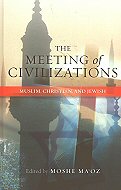The meeting of Civilizations
Muslims, Christians and Jewish
|
|
Edited by Moshe Maoz
|

|

The horrific acts of anti-Western and anti-Jewish terrorism carried out by Muslim fanatics during the last decades have been labelled by politicians, religious leaders and scholars as a “Clash of Civilizations”. However, as the contributors to this book set out to explain, these acts cannot be considered an Islamic onslaught on Judeo-Christian Civilization. While the hostile ideas, words and deeds perpetrated by supporters among the three monotheistic civilizations cannot be ignored, history has demonstrated a more positive, constructive, albeit complex, relationship among Muslim, Christians and Jews during medieval and modern times. For long periods of time they shared divine and human values, cooperated in cultural, economic and political fields, and influenced one another’s thinking.
Current political and economic conditions privilege adversarial approaches to Abrahamic relations, for a variety of reasons. First, the Abrahamic religions exist not only in texts that speak of past human encounters with the transcendent, but also in a world of large-scale social relationships. The religions, therefore, play a powerful role in the construction of cultural and national identities, and religious interpretation thereby becomes vulnerable to pressure arising from geopolitical competition and the efforts of political leaders to imbue their actions with religious legitimacy. Second, as an element of collective identity and a reservoir of cultural symbols, religious elements are frequently used in the definition of "enemy images" and the telling of conflict narratives. Third, the existence of adversarial relations between communities defined wholly or in part in religious warrants for peacemaking under conditions of insecurity have received little attention from political and clerical leaders.
Particularly vital at this time is the demonstration value of interfaith coexistence and peacebuilding initiatives. […]
Moshe Ma'oz is Professor Emeritus of Islamic and Middle Eastern Studies at the Hebrew University, Jerusalem and Visiting Scholar at Harvard University. He has published many books and articles on the political and social history of the Middle East.
|
|
